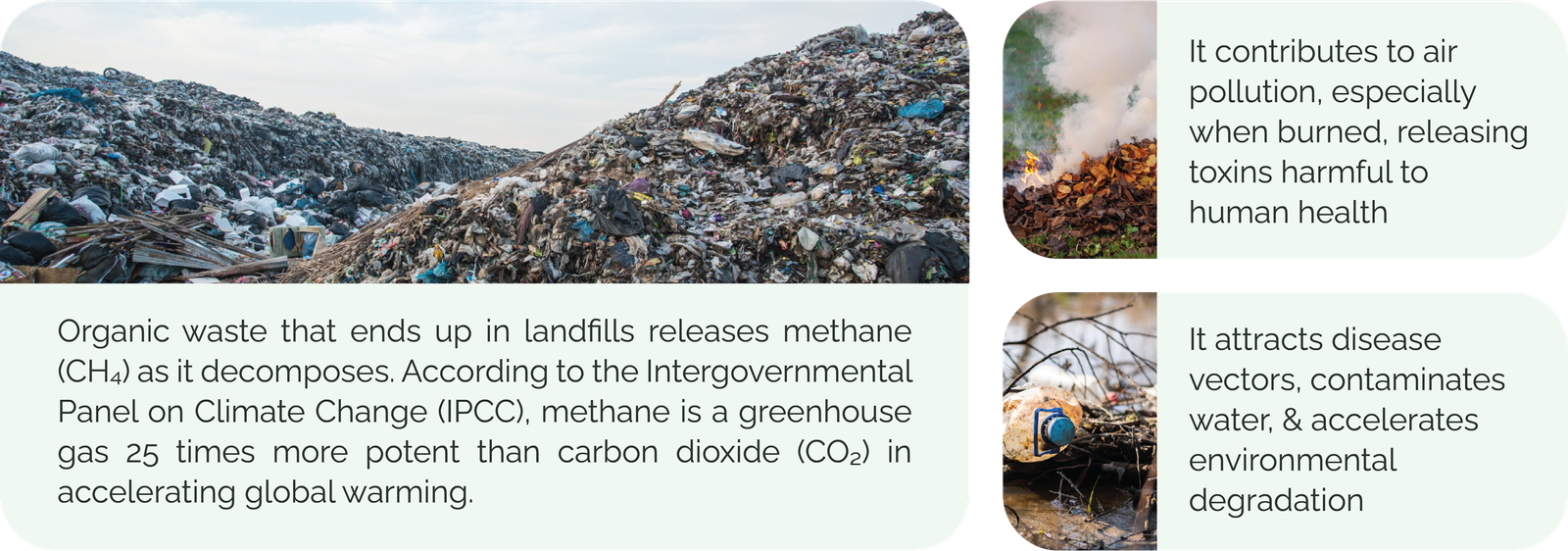Indonesia generates an enormous amount of waste, over 18 million tons every year. What’s more concerning is that more than 60% of it is organic waste, coming from households, markets, food industries, and hospitality sectors.
Left unmanaged, this organic waste poses serious threats:

Despite the scale of the problem, a large portion of organic waste in Indonesia is still handled poorly. A 2022 report by Databoks revealed that around 57 percent of Indonesian households still burn their waste regularly. In the capital city, GoodStats data shows that 31.1 percent of residents continue to burn domestic waste, despite regulations prohibiting such actions. The health implications are severe, smoke from open burning releases fine particulate matter (PM2.5), as well as harmful gases such as dioxins and furans, known to cause respiratory diseases, immune system disorders, and even cancer with long-term exposure, according to the World Health Organization (WHO). These methods not only fail to address the problem, but actively worsen both environmental and public health conditions.
Faced with this multi-faceted environmental and public health challenge, Indonesia urgently needs more sustainable and decentralized waste management solutions. One promising alternative lies in an unexpected source: the Black Soldier Fly (BSF).
Black Soldier Fly (BSF): A Sustainable Solution
Among the emerging solutions to Indonesia’s organic waste crisis, Black Soldier Fly (BSF) bioconversion stands out as one of the most promising, scalable, and environmentally sound approaches.
Here’s why BSF is gaining traction globally and why it’s especially relevant for Indonesia:
- Rapid Waste Reduction
BSF larvae can process organic waste efficiently, reducing waste volume by up to 70% within just 10–14 days. This speed makes it ideal for high-density urban areas where waste accumulates quickly. - Low Emissions
Compared to traditional composting, BSF-based systems can cut greenhouse gas emissions by up to 90%, according to the United Nations Environment Programme (UNEP, 2021). By avoiding methane emissions from landfill decomposition, BSF technology directly contributes to climate mitigation. - High-Value Outputs
The larvae are naturally rich in protein and fat, making them a sustainable source of feed for poultry, fish, and pigs. Meanwhile, the residual frass is an excellent organic fertilizer, enhancing soil health and supporting regenerative agriculture. - Space-Efficient & Scalable
BSF farms are compact and adaptable to urban and peri-urban areas, enabling decentralized waste management that reduces transport emissions and improves local resilience. - Supports a Circular Economy
Organic waste becomes a resource, closing the loop from consumption back to production. Black Soldier Fly Larvae should be positioned at the heart of a circular value chain, facilitating the recycling of nutrients and effectively meeting the growing global demand for protein. With further research and safety protocols, BSF also holds potential for future integration into human nutrition. A frontier for sustainable food systems.
In short, BSF isn’t just a waste solution. It’s a transformational tool for food security, climate resilience, and green economic growth.
At PT Hayuning Bhumi Makmur, we’ve proven that BSF-based systems work, not just in theory, but in practice. Through our integrated facility at the farm we’ve successfully diverted organic waste from landfills, processed it sustainably, and generated economic value through high-protein maggot biomass and organic fertilizer.
Our model combines environmental impact with community-based economic empowerment, demonstrating that the circular economy is not just possible but profitable and scalable.
